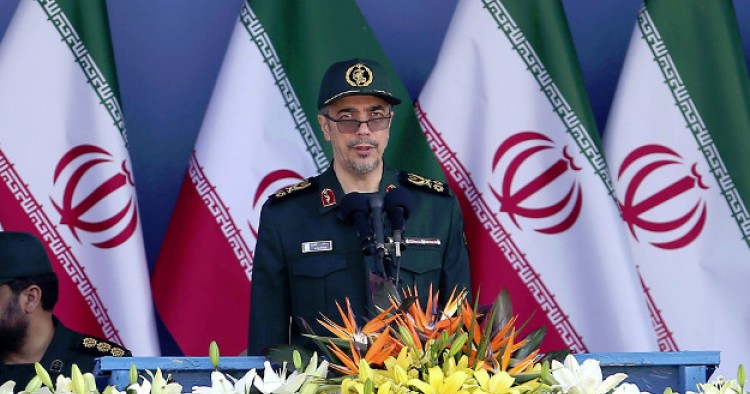The chief of staff of Iran’s Armed Forces warned on Monday that the country will leave the 2015 nuclear agreement if Washington reinstates anti-Iran sanctions. “The Islamic Republic decided to accept limitations to its nuclear program so that nuclear-related sanctions are lifted. However, if these sanctions return under other pretexts, the regime will decide that remaining in the JCPOA will be meaningless,” Major General Mohammad Hossein Bagheri said at a conference on civil defense in Tehran. He added that the JCPOA is not a “goal or a sacred verse that we adhere to under all circumstances,” and emphasized that “if sanctions are re-imposed, we will certainly leave the JCPOA.”
The top Iranian military official also ruled out any further negotiations with the United States, claiming that the Trump administration and U.S. Congress have joined hands to topple the ruling regime in Iran. “Someone who aims to overthrow us is not suitable for dialogue,” he added.
Bagheri claimed that the United States would not at this stage resort to a military attack against Iran because the cost of such an action would be too high. But he warned that the U.S. and its allies are taking other “sophisticated and sensitive” actions to weaken the Islamic Republic, such as aiding anti-Iran militant and separatist groups in the region and conducting cyber warfare against Iran. But he assured the audience that the Islamic Republic is capable of defending itself and that its power transcends Iran’s borders. “The country and the Islamic revolution are continuing their path… No decision can be executed in West Asia region without Iran’s presence.”
Comment: Earlier this month, President Donald Trump decertified the Iran nuclear deal, threatened to terminate it if Congress fails to fix the agreement’s loopholes, and authorized the Department of Treasury to levy new sanctions against the Islamic Revolution Guards Corps. Since then, there has been a fierce debate inside Iran about how to respond. The Rouhani administration appears willing to stay in the deal even if U.S. walks away from it as long as European powers do not side with Washington and they continue to do business with Iran. The military establishment and hardliners argue that European powers cannot be trusted and that Tehran should also abandon the deal if Washington reinstates pre-2015 sanctions.
Trump, who has called the Iran deal as an “embarrassment,” wants to renegotiate the agreement to impose more restrictions on Iran. These limitations would include a more robust inspection of Iran’s military sites for any potential covert nuclear activity, a halt to the country’s ballistic missile program, and an end to the so-called sunset provisions within the deal that allow Iran to resume nuclear enrichment after a decade. The Trump administration also wants Iran to moderate its destabilizing behavior in the Middle East.
But Iranian leaders have ruled out renegotiating the deal and threatened to resume high-level enrichment if Washington re-imposes sanctions.
The Middle East Institute (MEI) is an independent, non-partisan, non-for-profit, educational organization. It does not engage in advocacy and its scholars’ opinions are their own. MEI welcomes financial donations, but retains sole editorial control over its work and its publications reflect only the authors’ views. For a listing of MEI donors, please click here.













